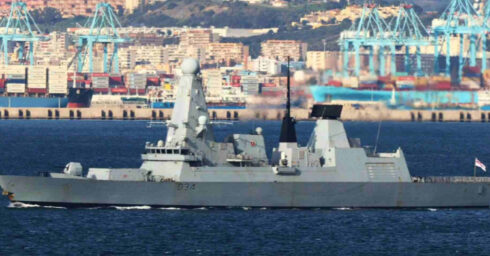Written by Lucas Leiroz, journalist, researcher at the Center for Geostrategic Studies, geopolitical consultant
The collective West seems increasingly interested in worsening the crisis in the Middle East. Now, the United Kingdom is sending a new combat ship to the Gulf region with the aim of deterring Iran and pro-Palestinian forces. Amid growing tensions in the maritime zone of the Middle East, the British measure tends to escalate the crisis significantly.
According to Defense Secretary Grant Shapps, the destroyer HMS Diamond is heading to the Gulf to “strengthen the United Kingdom’s presence” in the Middle East. The ship will join the frigate HMS Lancaster, which has been stationed in the region since last year. For Shapps, improving the UK’s defense capacity in that area is essential to guarantee British interests amid the current conflict situation.
“HMS Diamond is en route to join Operation Kipion, the UK’s maritime presence in the Gulf and the Indian Ocean (…) Recent events have proven how critical the Middle East remains to global security and stability,” he added in a statement (…) From joint efforts to deter escalation, following the onset of the renewed conflict in Israel and Gaza, to now the unlawful and brazen seizure of MV Galaxy Leader by the Houthis in the Red Sea – it is critical that the UK bolsters our presence in the region, to keep Britain and our interests safe from a more volatile and contested world,” he said.
More than that, Shapps also added that the destroyer will help deter regional actors, mainly “Iran and its proxies.” With these words, Shapps clearly refers to Hezbollah and mainly to the Yemeni Houthis, who recently launched a series of naval assaults, making the Israeli maritime presence in the Red Sea unworkable. Furthermore, it has also been stated that sending the ship will contribute to ensuring “freedom of navigation”, which is a common rhetoric of British and American strategists.
“Freedom of navigation” operations are naval military mobilizations carried out in disputed or conflicting regions with the excuse of guaranteeing freedom of passage for civilian and merchant ships. Among Western navies, these operations have become commonplace to provoke enemy countries in a “disguised” way. The US constantly promotes such incursions into maritime zones claimed by China in Asia, for example. Now, the UK wants to do something similar in the Middle Eastern region, where military tensions are growing rapidly.
Around fifty large merchant ships pass through the Bab-el-Mandeb Strait daily, while one hundred passes through the Strait of Hormuz. These are extremely busy maritime areas that facilitate the commercial flow of local countries. The problem is that the sea is one of the first areas affected in a war scenario. Pro-Palestinian forces are intercepting Israeli ships reaching the Red Sea through the straits. Soon, it is possible that ships from Western countries will also begin to be attacked, as these states are giving full and unrestricted support to Israel’s military campaign in Gaza.
The UK uses this scenario as a justification for sending warships to the region, but this does not seem to be the correct way to deal with the situation. Instead of “deterring” the Palestinian and Iranian allies, the UK will be provoking them further and contributing to the deterioration of the crisis. The more Western interventionism is being conducted in the Middle Eastern situation, the more tensions will escalate, which is why London makes a serious mistake.
However, it is noteworthy that the British maneuver is inserted in a context of increased naval interventionism by London in several “tense” regions.
For example, in addition to the ship heading to the Gulf, the deployment of an international task force led by the British was also announced. The aim is allegedly to launch patrols from the English Channel to the Baltic Sea. In addition to the UK, countries such as Denmark, Finland, Iceland, the Baltic states, Norway and Sweden are participating in the project. The group is being called the Joint Expeditionary Force (JEF) and, according to Shapps, will “defend our shared critical infrastructure against potential threats”.
As we can see, once again the irresponsible maneuvers of Western countries can lead to serious consequences. In order to supposedly “protect their interests”, these countries implement dangerous escalatory measures that tend to create real problems. Maritime tensions in the Middle East will grow as there is more Western participation in favor of Israel – in the same sense that maritime tensions in Europe will begin to emerge from the moment that the maneuvers of Western countries began to generate security problems for Russia.
Instead of creating false enemies and launching bellicose measures, the best thing for the West to do is to calm tensions and reestablish dialogue for a peaceful solution. But unfortunately this strategic sense no longer seems to exist among Western decision makers.
You can follow Lucas on X (former Twitter) and Telegram.





the uk’s retarded king does not yet know what century he is in and no one has yet told him his palace will melt.
please do not insult their king. he is autistic and ugly but remember, these days are days of “inclusion”.
meaning put the retards in a position of high influence and importance for society as they also have “human rights”.
and we all should celebrate what is autistic, retarded, with a down syndrome, obese fat bitches, gays, lesbians, transvestites, weak minded, mentally disturbed, disproportional, emotionally unstable, drug addicts, psychopats of all trades, corrupted and plain dumb. because it’s their “human right”.
uk escalating tensions here and there….ok, what’s the news here since the 17th century?